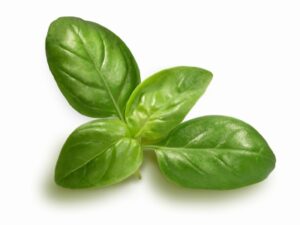(Ocimum basilicum)
Benefits of Basil
The main benefits are:
- it helps digestion
- fortifies the nervous system
- it is good for headaches
- is anti-inflammatory (due to its eugenol content)
- is a mild diuretic
- it has some antibiotic properties
- contains antioxidants (the main type of phenolics found in basil are the flavonoids, which include vicenin, orientin, eugenol and anthocyanins).
Uses of Basil
It can be used in many ways, such as:
Eat fresh – wait until the last moment to add fresh basil leaves to a dish. Scatter over salads, soups, egg and rice dishes.
Make a smoothie – add a handful of basil leaves to banana/strawberries/pineapple, add water/nut milk, add chia seeds/flax seeds, any other veg if wanted – blend and drink!
Steam for a headache – a steam inhalation with fresh or dried basil leaves may help to alleviate a headache. Add a tablespoon of dried basil leaves to 2 cups of boiling water in a large pot. Carefully lean over the pot, cover head with a towel and breathe in the steam for 5-10 minutes until headache starts to subside.
Coughs – chew a few fresh leaves to calm coughing or make a calming tea from dried basil to help sooth colds.
Make basil tea – add 2 basil leaves to 1 cup of freshly boiled water, brew and drink. You can add more basil (according to taste) as well as ginger, turmeric, cinnamon, honey, mint and any other herbs/spices.
Blood sugar – there is some evidence that basil can help level out blood sugar if consumed regularly and drank as a juice or tea (see study below – hypoglycemic activity of basil). A supplement may help too.
Studies
Antibacterial activity: http://www.ncbi.nlm.nih.gov/pubmed/26455352
Basil essential oil against multi-drug resistant bacteria: http://www.sciencedirect.com/science/article/pii/S0167701203000125
Hypoglycemic activity of basil: http://tih.sagepub.com/content/28/1/42.abstract
Antibacterial activity: http://www.ajol.info/index.php/ijonas/article/view/36092